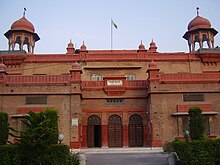Peshawar Museum

The Peshawar Museum ( Urdu : پشاور متحف) is a museum in the Pakistani city of Peshawar . Built under British management in the Indo-Islamic style and inaugurated in 1907, the museum is dedicated to the history and cultural heritage of the various regions of northern Pakistan. Further extensions were added in 1969/70 and 1974/75.
collection
- Gandhara art
The most important parts of the museum collection are artifacts (coins, sculptures, etc.) of the Gandharakultur -.. Including the around the year 150 AD made Kanishka - reliquary with one of the oldest known representations of Buddha .
- Islamic art
Another focus is on Islamic art of the Middle Ages and modern times.
- Ethnological department
The ethnological department is dedicated to the costumes, tools, weapons and customs of the various ethnic groups in northern Pakistan (including the death figures etc. of the Kalasha tribe ).
- Iranian department
A donation from 2003 resulted in the establishment of an Iranian department.
Web links
Coordinates: 34 ° 0 ′ 28 ″ N , 71 ° 33 ′ 30 ″ E
